 A reader asked, is fish really good for brain function and if so which fish is best? Some fish contain Omega 3 fatty acids which have been shown to improve memory function, increase serotonin (elevate mood) and support longer-lasting cells and more efficient messaging.
A reader asked, is fish really good for brain function and if so which fish is best? Some fish contain Omega 3 fatty acids which have been shown to improve memory function, increase serotonin (elevate mood) and support longer-lasting cells and more efficient messaging.
Mindpower Magazine has an interesting post claiming that Tilapa (a popular fish) has little brain benefit as it contains Omega 6 rather than Omega 3 fatty acids. Here is their list of the best brain fish:
- Salmon (wild salmon is preferred to the farmed variety)
- Mackerel
- Trout
- Whitefish
- Bluefin Tuna
- Sardines
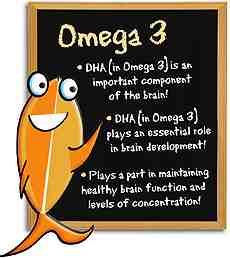 Jean Carper, author of Your Miracle Brain (discussed in another post) offers this list of Ten Fish with the Most Smart Fats:
Jean Carper, author of Your Miracle Brain (discussed in another post) offers this list of Ten Fish with the Most Smart Fats:
- Anchovy
- Bluefish
- Herring
- Mackerel
- Sablefish
- Salmon
- Sardines
- Lake Trout
- Tuna, bluefin
- Whitefish
There is considerable overlap in the two lists. Interested to hear from reader about their favorite brain fish or about which fish to avoid and why.
Sources:
Image of Fresh Fish Market and image of Omega-3 Poster
Drawing a diagram can be a powerful problem solving technique. Creating a visual representation forces our brain to process information in a specific way and it provides something new for us to see or perceive. Any technique, no matter how simple, that cause us to think differently and see differently holds the promise for improving problem solving and creativity.
Visual techniques designed to systematically stimulated improved thinking will be a frequent topic on the Next Brain Blog. Take for example, the recent work by Dan Roam. He has two books on on using visual thinking including The Back of the Napkin and Unfolding the Napkin.
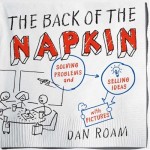
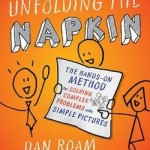
His work is based on a four-step approach to visual thinking including look, see, imagine and show.
If you want to a jump-start on Roam’s approach to visual thinking, check out this 8-page BPTrends review of the Back of the Napkin.
I am interested to hear from readers that have used visual thinking techniques to improve problem solving, creativity or other aspects of cognition.
A reader suggested Brain Boost, a new iPhone app.
.
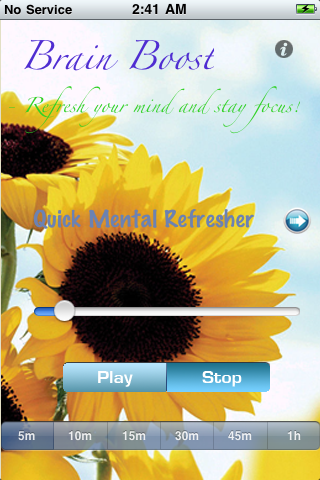
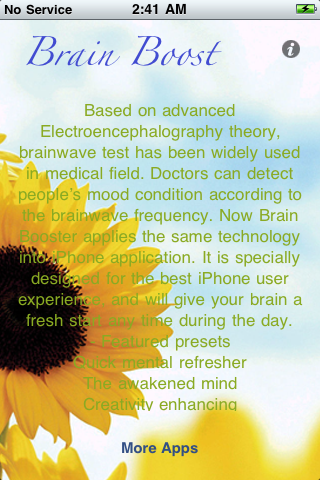
Like to hear from readers that use this or other apps designed to improve cognitive performance.
 Working memory loads and processes the information we can pay attention to at any given time. It is has a limited capacity (4-9 pieces of information) and it does not last long (3-20 seconds). Technically working memory is different but related to short-term memory. It involves the control and attentional processes for manipulating the information. Some experts call it the search engine of the brain:
Working memory loads and processes the information we can pay attention to at any given time. It is has a limited capacity (4-9 pieces of information) and it does not last long (3-20 seconds). Technically working memory is different but related to short-term memory. It involves the control and attentional processes for manipulating the information. Some experts call it the search engine of the brain:
“Working Memory is an essential cognitive function that allows us to keep information in mind, manipulate it, and use it in our thinking. It is the way that we process the onslaught of information that we encounter every day.”
A simple thing but clearly it plays a major role how well we perform all manner of mental activities. Techniques for improving working memory will be a frequent topic on the Next Brain Blog.
One program that has seen some real success is Cogmed. This is a neuroscience-based program that is geared to age group and goal. The program uses software, is coach-guided for first few weeks and has a self administered maintenance phase. They have a high completion rate, many specific success stories and are backed by clinical studies.
I am interested to hear from readers that have used Cogmed or other working memory training programs to achieve peak cognitive performance.
Source: Image of Brain
 One question new parents ask is what natural things can I do to stimulate the development of my baby’s brain and make them smarter? There are number of very simple things that have good scientific evidence behind them. For example, new research from Northwestern University confirms that talking to your baby accelerates their cognitive development. Using the right words improves their ability to categorize objects.
One question new parents ask is what natural things can I do to stimulate the development of my baby’s brain and make them smarter? There are number of very simple things that have good scientific evidence behind them. For example, new research from Northwestern University confirms that talking to your baby accelerates their cognitive development. Using the right words improves their ability to categorize objects.
It has long been held that talking to your baby is good for mental development but the Northwestern research found that this is so for the very young, only 2-4 months. The researchers write:
“We suspect that human speech, and perhaps especially infant-directed speech, engenders in young infants a kind of attention to the surrounding objects that promotes categorization,” said Waxman, a co-author and professor of psychology. “We proposed that over time, this general attentional effect would become more refined, as infants begin to cull individual words from fluent speech, to distinguish among individual words and kinds of words, and to map those words to meaning.”
Hearing object-correlated words influences infants’ cognition even in the first few months of life! The key is to clearly use “real words” or ones that properly pick out objects.
It is not clear what the longer term brain-boosting advantages of this are but the ability to categorize is fundamental to how we think.
To get started you may want to check out the talking pointers from the Center for Early Literacy. If you use this technique, or others to boost your baby’s brain development, please share your experience with other readers by leaving a comment.
 Physical exercise, especially cardio, is good technique for improving brain function. There is no doubt about that. So is specially designed cognitive training software that gives your brain a workout by solving problems, meeting perceptual challenges and even playing games. Imagine combining the two – exercising while working with cognitive training software – to get a double dose of brain training in a single session. That is exactly what the NeuroActive Bike does.
Physical exercise, especially cardio, is good technique for improving brain function. There is no doubt about that. So is specially designed cognitive training software that gives your brain a workout by solving problems, meeting perceptual challenges and even playing games. Imagine combining the two – exercising while working with cognitive training software – to get a double dose of brain training in a single session. That is exactly what the NeuroActive Bike does.
Combing their NeuroActive cognitive training software with an exercise bike the Brain Center of America is the first to introduce a brain bike.
They are available in some health clubs in France, the US and Canada. Here is a list. A few schools in the US are introducing them. For example, I found this story and photo (to the right) about Madison School in Naperville, Illinois.
I have not seen any studies on the effectiveness of this type of double dipping but will keep an eye out. In the meantime I am interested to hear from readers that have taken a ride on the Brain Bike.
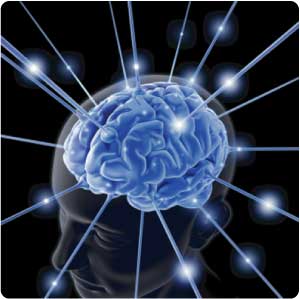 The speed at which your brain processes information is a fundamental measure of cognitive efficiency. Faster processing speeds have been linked to more effective intelligence, memory formation and even longevity. In short, the faster you think the smart you are! Happily, you can easily measure, and with practice improve, your thinking speed. Tools and techniques for increasing the speed of thought will be a frequent topic on the Next Brain Blog.
The speed at which your brain processes information is a fundamental measure of cognitive efficiency. Faster processing speeds have been linked to more effective intelligence, memory formation and even longevity. In short, the faster you think the smart you are! Happily, you can easily measure, and with practice improve, your thinking speed. Tools and techniques for increasing the speed of thought will be a frequent topic on the Next Brain Blog.
One way to get started is to take the Thinking Speed Test at Cognitive Labs. You need to go through a brief registration but it is worth it. They give you a short reaction time test and some handy feedback. You can even track your performance over time.
Try it out and post your results. Especially interested in what techniques you are using to improve it. My initial score was 241 milliseconds.
Source: Image of the Brain
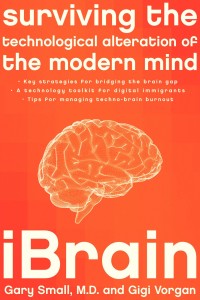 Email, search engines, social networking sites, text messaging, blogging, twitter, web-based phones, GPS, playing/making music/videos, taking and instantly sharing pictures and a slew of other technological capabilities have become widely available thanks to the internet, mobile phones and other hand-held gadgets. These new ways of creating, finding, sharing and using information are so powerful and pervasive that they are transforming how we learn, make-decisions, collaborate creatively and do many other brain-intense activities.
Email, search engines, social networking sites, text messaging, blogging, twitter, web-based phones, GPS, playing/making music/videos, taking and instantly sharing pictures and a slew of other technological capabilities have become widely available thanks to the internet, mobile phones and other hand-held gadgets. These new ways of creating, finding, sharing and using information are so powerful and pervasive that they are transforming how we learn, make-decisions, collaborate creatively and do many other brain-intense activities.
Some argue that they make us smarter or dumber. For example, the Atlantic Magazine article, Is Google Making Us Stupid? triggered a firestorm of discussion. Fortunately, the answer is no. Google and using search engines actually makes us smarter! Others take the point further and argue that the collective effect of all these technologies is driving a rewiring of our brains on a basic level. For a good introduction to this type of argument check out the book, Surviving the Technological Alteration of the Modern Mind.
The book’s theme is controversial but the authors do a great job outlining the specific technologies and their likely impact on boosting or dowsing cognitive performance. This is just the kind of information we will be covering in the Next Brain Blog. I will look at each claim and recommendation in later posts.
In the meantime, I am interested to hear reader stories on how the internet or mobile computing is being used to improve cognitive performance and build a better and longer-lasting brain.
 In the Next Brain Blog we explore specific ideas and tools for improving cognitive performance and brain function. Low lying fruit or approaches that are simple, scientifically proven and easy to enact are of special interest.
In the Next Brain Blog we explore specific ideas and tools for improving cognitive performance and brain function. Low lying fruit or approaches that are simple, scientifically proven and easy to enact are of special interest.
Consider for example the simple act of drinking coffee or a relate caffeinated beverage. The scientific evidence for the brain-enhancing effects of coffee are really stacking up. A recent post on Psychology Today’s New Brain Blog, The Fountain of Youth in A Cup of Coffee – Ladies Only, reports:
“Coffee lovers appreciate the mood kick and mental boost a delicious cup of java provides. The enhanced learning, memory, and speed of information processing caffeine delivers has been well documented scientifically. New research published on-line in the current issue of the Journal of Alzheimer’s Disease, reports that coffee can also ward off some effects of aging on the brain. Previous research has shown that caffeine lessens the damage of Alzheimer’s disease caused by the toxic peptide that forms the senile plaques in brains of Alzheimer’s patients. This new study examined 641 elderly persons (over the age of 65) living in three cities in France, Bordeaux, Dijon, and Montpellier. Researchers found a relation between coffee consumption and prevention of cognitive deterioration including the loss of brain tissue in the elderly.”
The post goes on to discuss a recent brain scanning study that shows women (but not men) that drink 3-cups (but not less) of coffee per day lose less white matter after age 50. Thus the subtitle on the post – for women only. But the other studies and effects appear gender neutral.
Boosting energy, mood, memory, learning, processing speed as well as blocking aspects of cognitive decline… all from drinking coffee!
Coffee can have other effects as well. Any changes in diet, physical activity or lifestyle should be considered carefully.
Source: Image of Coffee Man
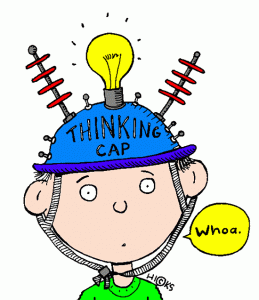 Making formally sound and psychological convincing arguments is hard mental work. It is a form of critical reasoning and therefore practicing it is a great technique for improving your thinking (cognitive) skills. Argumentation and how to use it to improve cognitive performance will be a frequent topic on the Next Brain Blog.
Making formally sound and psychological convincing arguments is hard mental work. It is a form of critical reasoning and therefore practicing it is a great technique for improving your thinking (cognitive) skills. Argumentation and how to use it to improve cognitive performance will be a frequent topic on the Next Brain Blog.
We can learn how to make good arguments much as we can learn to make good food, music or art. It takes an understanding of the fundamentals of argumentation, tons of practice and taking on new and challenging situations regularly. Fortunately, the fundamentals of argumentation are clear, there are many opportunities to constructively practice at home, work and in the community and new challenges are presented to us daily.
Getting started in the art of argument requires a clear statement of the point you want to make (the conclusion) as well as a clear statement of what justifies it (premises).
Just writing down your premises and conclusion can be a difficult challenge but one that adds enormously to the clarity of thought.
A good argument is one where the conclusion can be logically inferred from the premises, is free of logical fallacies, anticipates and deflates counter arguments, has well-justified premises and clearly delineates factual claims from opinions.
For a great introduction to the ideas of formal and informal validity of arguments check out the post, What Makes a Good Argument? on the Thinking Matters Blog. It covers the 9 types for formal validity you are likely to use as well as 8 common informal mistakes you are likely to commit.
You can show that your argument is formally valid by demonstrating the conclusion (Q) follows from the premises (P) using one or more of the rules of deductive logic. For example, one rule is called modus ponens (and I quote from Thinking Matters):
“Modus ponens is Latin. It means “the mode which affirms”. Knowing the English translation makes it very easy to follow:
- P –> Q
- P
- Q
In plain English: if P, then Q; P, therefore Q. “P” and “Q” represent propositions, so it’s helpful to substitute in simple phrases for them, to get a better idea of what the rule is saying. For example, let P mean “it is raining”, and let Q mean “the ground is wet”. So:
- If it is raining, then the ground is wet.
- It is raining.
- Therefore, the ground is wet.
As you see, this is really a very simple and obvious rule—as you’ll find that all the fundamental rules of logic are.”
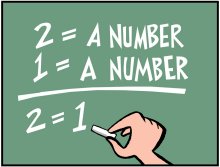 Formal validity is not enough. Your argument must also must avoid falling into a logic trap. For example, consider the argument from ignorance (quoting from Thinking Matters):
Formal validity is not enough. Your argument must also must avoid falling into a logic trap. For example, consider the argument from ignorance (quoting from Thinking Matters):
“Arguing that a belief is false because there is insufficient evidence for it.
- No one can disprove the existence of God. Therefore, God exists.
- There’s no evidence that the Red Sea was ever parted. Therefore, the account in Exodus is a myth. (Notice, though, that an argument saying that there is evidence that the Red Sea was not ever parted would not be fallacious.)”
I have heard many arguments made this way. It may take you an hour or so to work through all 17 principles and really understand each one. However, it is well worth your time. With a basic understanding you can use them as a quick checklist to refine the clarity, power and validity of your arguments.
I am interested to hear from readers that practice the art of argumentation and how it has impacted your effectiveness as a thinker.
Sources: Image of Thinking Cap, Image of Logical Fallacy
 A reader asked, is fish really good for brain function and if so which fish is best? Some fish contain Omega 3 fatty acids which have been shown to improve memory function, increase serotonin (elevate mood) and support longer-lasting cells and more efficient messaging.
A reader asked, is fish really good for brain function and if so which fish is best? Some fish contain Omega 3 fatty acids which have been shown to improve memory function, increase serotonin (elevate mood) and support longer-lasting cells and more efficient messaging. Jean Carper, author of Your Miracle Brain (discussed in another post) offers this list of Ten Fish with the Most Smart Fats:
Jean Carper, author of Your Miracle Brain (discussed in another post) offers this list of Ten Fish with the Most Smart Fats:











